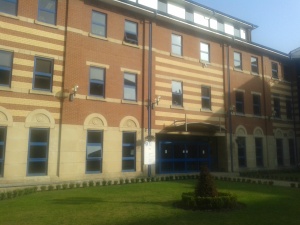I’m back for the Tuesday installment of Hack Library School Day in the Life.
Before I start, just a quick note on some of the blogs and tweets from over the pond. It’s really interesting to read what American library schoolers are up to, and the main difference relates to internships. Library internships seem to be all the rage – perhaps it is compulsory to do a work placement during your masters? I know a couple of UK schools also encourage them, but as far as I know they’re not an assessed part of the course, and in Sheffield they don’t feature at all. You can’t get on the course unless you’ve done a year’s experience in a library, so I assume they think it’s not important to have a work placement, but I think a short, structured placement with an assessment to go with it would be a great idea. It would give me a chance to try something completely new. I’d like to get some practical experience with institutional repositories and metadata, for example, which isn’t taught on the course. The downside of internships is that the longer ones encourage the culture of working for free in order to get your foot in the door. I would hate to see libraries go down the route of publishing, culture & heritage and charities, which rely on interns instead of paid workers. But a short, educational placement in a different sort of library would be great – I may look at organising myself one in the summer.
Anyway, Tuesday morning: another 11am start (much better than working full-time!) My lecture today was from the module Library Services for Children and Young People. It’s been a very interesting module so far, and has included a visit to Sheffield Children’s Libraries, a talk from a school librarian at an independent school and an entire lesson looking at the best picture books to promote diversity (check out And Tango Makes Three, about two male penguins raising an egg, aww). Today’s session was on ethical considerations in collection development, and was presented by Liz Chapman. She’s a PhD student in the department, and is doing some great research into LGBT resources in public libraries – if you ever need a list of LGBT fiction for children and young people, she’s the one to turn to. We discussed issues that didn’t really have a definitive answer today: how far should children’s right to intellectual freedom stretch? Should books have age-banding? Should parents have the right to see what their child is borrowing? What shouldn’t be included in a children’s collection? Where should we shelve Jacqueline Wilson? Liz told us that a lot of frontline library staff didn’t have training on ethical issues, and were poorly equipped for handling complaints or problems – it’s the responsibility of the organisation to have a clear policy and deliver appropriate training.
After lunch, I wandered fruitlessly round our two big university libraries and completely failed to find a computer, which was very irritating. So I ended up returning to the iSchool to take notes from a hard-copy book on a hard-copy notepad. So old fashioned.
Here is Sheffield iSchool in the sun! Long may the sun last.
I didn’t have a lecture in the afternoon so I worked on my assignment for Children’s Libraries, which is to design a school library, producing an annotated sketch plan and report. So far, I’ve been reading up about different recommendations for library space for young people. There’s lots of examples from America about public libraries that have gone for themed areas for young people, as well bean bags, reading towers, gaming areas and all kinds of other exciting things. I think school libraries probably need to be a bit more toned down though! Comfy seating still features heavily, and lots of flexibility and natural light. The most interesting thing that I read was the idea that young people brought up in the age of key-word searching are not interested in learning about how to use a library classification system – tempting them to pick up a book is a lot more useful than trying to teach them “library skills.” I wonder if people agree? The book I was reading was a very good recent one – Library Services for Children and Young People, by Carolyn Rankin and Avril Brock, published by Facet.
In the evening, I went to a meeting in the city centre about saving Sheffield Public Libraries. Unfortunately, we have just heard that 14 out of our 27 branch libraries in Sheffield are under threat of closure because of cuts to council funding. Public libraries are in a precarious position in the UK at the moment – the government is keen to save money by handing them over to groups of volunteers to run, meaning that paid staff members will lose their jobs. Other groups all over the country are fighting against library closures too, as well as severe cuts to other council services. At times it seems like a losing battle, but the meeting tonight was well attended. We’ve got a Facebook page set up – odd acronym, I know – and managed to plan some ways to build the campaign before the next meeting in three weeks time.
No lectures tomorrow, so I’m hoping to make headway on this Children’s Libraries assignment before having coffee with my sister in the afternoon and going to an Anais Mitchell and Jefferson Hamer gig. Yay!


